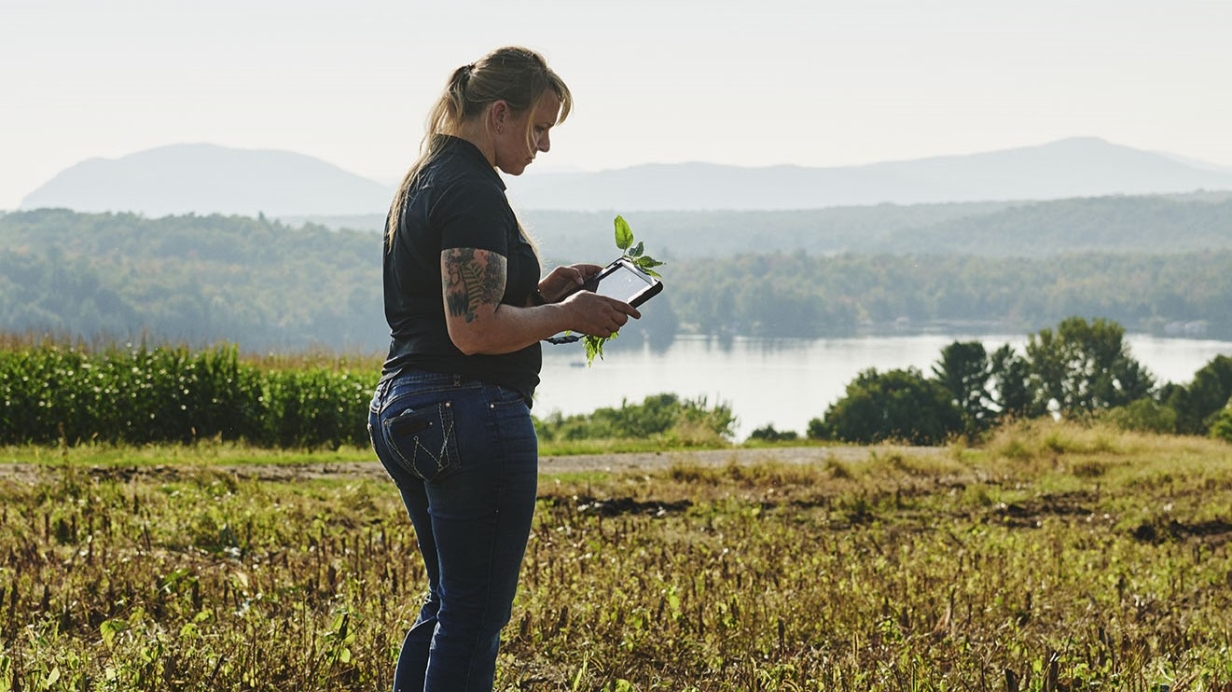Second AgroCarbone Grandes Cultures workshop: The road to carbon farming
What does Québec’s agricultural industry need to get carbon farming up and running in the province? That was the question of the day as the expert partners working on the AgroCarbone Grandes Cultures initiative met for their second collaborative workshop in fall 2024.
The purpose of the workshop was to hash out a framework that could drive the adoption of carbon farming in Québec—and draw up a plan to implement it.
The event opened with a presentation from the Coop Carbone team on the state of carbon farming in Québec and around the world. Participants also took stock of the work done as part of the AgroCarbone Grandes Cultures initiative, including the spring 2024 farmer survey results.
This set the stage for a series of discussions between farmers and their expert partners, with a focus on five key themes.
1 . Compensation
How can farmers be fairly compensated for their efforts to protect the environment? What kinds of support would be the most effective? Several ideas were put forward:
Public compensation or subsidies
Creation of an exclusive label to promote sustainable practices and make farmers’ efforts more visible
Rebate programs based on environmental performance indicators for farmers adopting best practices
Increased financial support from private and government programs to drive innovative practices
2. Resources
What resources are needed to support the adoption of carbon farming practices? Québec has expertise in data measurement and management, but there’s a lack of operational resources, specialized training, and standardized methods.
Financial and human resources: If we want to be effective in implementing carbon sequestration measures, we need more funding and qualified personnel.
Standardization: If we want to have a consistent and reliable approach across the province, we need to harmonize our data measurement and collection methods.
Access to technology: If we want to be able to quantify our carbon sequestration reliably, we need access to affordable technology and high-performance measuring equipment.
3. Trust
How do we produce reliable, verifiable carbon credits? Workshop participants stressed the importance of establishing a unified standard for calculating offset credits, including an independent and transparent audit framework. This would enhance the credibility of sequestration projects in the province and bolster trust among both farmers and investors.
Role of cooperatives: We must get agricultural cooperatives more involved in the certification process to better relay the needs of farmers.
Independent auditing: Carbon credit audits need to be handled by independent organizations to maintain transparency and avoid conflicts of interest.
4. Made-in-Québec protocols
How can we develop carbon quantification protocols that make sense for our local producers? By working with the Québec government, scientific institutions, and private entities to make sure they meet the highest standards.
Protocol co-creation: We need to involve universities, researchers and farmers in the creation of Québec-specific protocols to accurately estimate organic carbon sequestration in agricultural soils.
Technological innovation: We need to use cutting-edge technologies like remote sensing to help quantify emissions reductions and carbon sequestration.
5. Obstacles
What’s standing in the way of carbon farming in Québec? Workshop participants named a variety of obstacles:
Political engagement: We need a strong commitment from lawmakers to deliver public policy that supports and truly prioritizes carbon farming on a structural level.
Concrete action plan: Drawing up a detailed plan is essential to structuring our efforts and optimizing our interventions in the field.
Funding for the transition: We need to unlock more sources of funding and direct existing sources towards sustainable practices.
Coordination: We need better collaboration between agriculture industry players, research institutions, and private partners to maximize the impact of our actions.
Standardized audits and rewards for adopting good practices: We must develop a clear methodology and a fair compensation system to reward farmers.
Next steps: Taking action
This workshop marked an important step forward for AgroCarbone Grandes Cultures. It put the focus on collaboration, innovation, and concrete solutions to lay the groundwork for integrated, sustainable carbon farming in Québec.
The next step is to take action by:
Developing an experimental protocol that will serve as the basis for future pilot projects.
Creating a roadmap for operationalizing the first pilot projects by March 2026. It should consolidate the knowledge acquired thus far and distill our intentions into concrete actions.
What is AgroCarbone Grandes Cultures?
AgroCarbone Grandes Cultures is a program aimed at reinventing the business models of Québec farms in response to climate change. The goal is to find solutions to:
Reduce GHG emissions
Promote carbon sequestration
Give farmers economic leverage
You can contact AgroCarbone Grandes Cultures to learn more and join the program.

